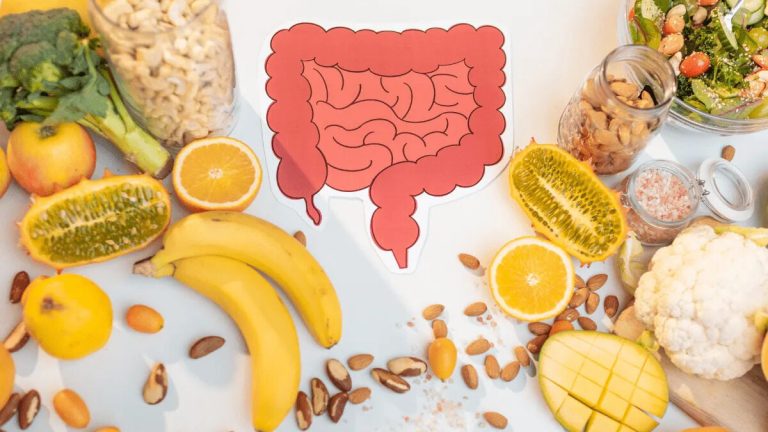The Importance of a Healthy Gut in Overall Health
The gut plays an important role in overall health. It is not only responsible for digestion and the absorption of nutrients from food, but it also has a direct connection to the immune system, mood regulation, and brain function. When the gut microbiome—the collection of trillions of bacteria in our gut—is balanced, our digestion improves and our defenses against illness become stronger.
When the gut microbiome is imbalanced, various health issues can arise. These include irritable bowel syndrome (IBS), food intolerances, and even mental health issues such as depression and anxiety. Studies have shown that the connection between the gut and the brain is crucial for our daily health, so taking care of the digestive system should not be neglected.
To maintain a healthy gut, it is important to eat the right foods that support beneficial bacteria. By following a balanced diet rich in fiber, probiotics, and whole, natural foods, digestion can be improved and a strong immune system can be maintained.
Fiber: The Key to Healthy Digestion
Fiber is an important part of the diet that directly affects the gut. There are two types of fiber: soluble and insoluble. Soluble fiber dissolves in water and helps lower cholesterol and blood sugar levels. It can be found in fruits, vegetables, oats, and legumes. Insoluble fiber, on the other hand, does not dissolve and helps promote regular bowel movements; it is found in whole grains, nuts, and vegetables.
When fiber intake is sufficient, the movement of food through the gut becomes more efficient. Fiber acts as food for good bacteria, helping to increase the number of probiotics in the digestive system. Having enough fiber in the diet also helps reduce the risk of colon cancer and other digestive disorders.
In addition to its benefits for digestion, fiber also has a positive impact on long-term health. It helps with weight loss, maintains stable energy levels, and reduces inflammation in the body.
Probiotics: The Good Bacteria for the Gut
Probiotics are live bacteria that have a positive effect on gut health. They help balance the gut microbiome and improve digestion. When there are sufficient probiotics in the gut, nutrient absorption is more efficient and digestive issues such as bloating and diarrhea are reduced.
Many foods are rich in probiotics, including yogurt with live cultures, kefir, kimchi, sauerkraut, miso, and tempeh. These are fermented foods that contain natural good bacteria that can support gut health. In addition, probiotic supplements are available to support the digestive system, especially if fermented foods are not consumed regularly.
Regular consumption of probiotics may help those with digestive disorders such as IBS, lactose intolerance, and acid reflux. Studies have also shown that probiotics are linked to improved mental health, due to the connection between the gut and the brain.
Prebiotics: Feeding the Good Bacteria
In addition to probiotics, prebiotics are also important for gut health. Prebiotics are a type of dietary fiber that serves as food for the good bacteria in the gut. They are not digested by the body but serve as fuel for probiotics, enhancing their effect.
Prebiotics are found in foods such as garlic, onions, leeks, asparagus, bananas, and oats. When incorporated into the diet, they make probiotics more effective in maintaining proper gut balance. The combination of probiotics and prebiotics is an effective way to improve digestion and immune function.
By consuming sufficient prebiotics, the gut’s condition is better maintained. They not only improve digestion but also contribute to the long-term health of the heart and brain.
Foods to Avoid for a Healthy Gut
Excessive consumption of processed foods and refined sugars can damage the gut microbiome. These can lead to an increase in bad bacteria and a reduction in the number of good bacteria in the gut.
Artificial sweeteners, such as aspartame and sucralose, can affect the gut microbiome and may cause digestive discomfort. Excessive caffeine and alcohol can also irritate the digestive system, potentially leading to acid reflux and other stomach problems.
Instead of processed foods and sugary drinks, it is better to eat whole foods, fruits, vegetables, and fermented foods rich in probiotics. Avoiding unhealthy foods is an important step in improving gut health.
The Role of Water in Gut Health
Water plays a crucial role in digestion and gut health. When the body is dehydrated, it can lead to constipation and poor movement of food through the gut.
Regular water intake helps maintain proper moisture levels in the gut, which is important for waste elimination. Proper hydration also aids in the absorption of nutrients and boosts immune function.
The Importance of a Balanced Diet for Gut Health
A balanced diet has a significant impact on the gut microbiome. Eating the right amounts of protein, healthy fats, and carbohydrates helps improve digestion and energy levels.
Foods that contain omega-3 fatty acids, such as salmon and walnuts, have anti-inflammatory properties that can benefit gut health. Whole grains like quinoa and brown rice provide essential fiber for the gut.
By choosing natural and whole foods, the balance of gut bacteria is better maintained and the digestion process becomes more effective.
The Impact of Stress on Gut Health
Stress has a significant impact on gut health. When stress levels are high, digestive issues such as bloating, acid reflux, and diarrhea can occur.
Relaxation techniques such as meditation, deep breathing, and yoga can help reduce stress and improve digestion. Regular exercise also has a positive effect on gut health because it helps regulate gut bacteria.
Rest and adequate sleep are also important for maintaining proper gut balance. Proper stress management is a crucial part of a holistic approach to gut health.
Building Sustainable Gut Health Habits
Incorporating fiber-rich foods, probiotics, and prebiotics into your daily diet can help improve digestion and strengthen the immune system.
In addition to proper nutrition, regular exercise, adequate sleep, and stress management are essential to maintaining gut health.
By following the right diet and a healthy lifestyle, many digestive issues can be prevented and overall health can be maintained.




